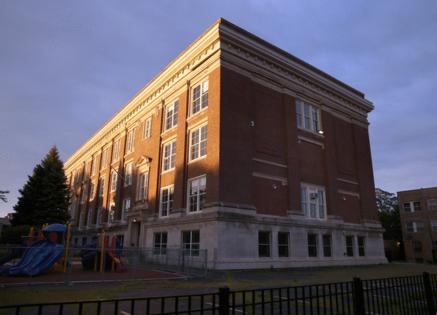Editorial: Why is CPS treating charter and private schools like liquor stores?
Published in Op Eds
Chicago Public Schools is selling off 21 school properties, hoping the sales will result in a nice windfall of cash and reduced maintenance costs in the long run. This board applauds such sensible decision-making, which should be completely uncontroversial.
Except that this is Chicago, and so even something as seemingly commonplace as selling an unused school building comes with a touch of the absurd.
And here’s the catch. All of the CPS properties come with deed restrictions prohibiting their use for selling liquor or tobacco — or reopening them as charter schools, Chalkbeat Chicago reported. That’s like selling a candy factory and banning the new owners from making chocolate — the structures were designed for education and should remain so, especially if the district wants to preserve their historic character.
If CPS were to create a warning label for this trio, it would read something like: May cause lung cancer, cirrhosis and literacy. This is absurd.
Of course, CPS’ restrictions on the use of these 21 school properties doesn’t exist in isolation — there is plenty of other context that applies to what’s going on.
For one, many of the buildings on the market today were shuttered by former Mayor Rahm Emanuel, who in 2013 approved the closure of 50 public schools, a decision that rankles many to this day. The city held onto many of these properties for decades, costing millions in maintenance fees for vacant buildings. Getting these properties off the books is a good thing, but it’s also worth noting that sales that have already gone through are not raking in massive amounts of money. The old Alexander Von Humboldt School sold in 2015 for $3.1 million, little more than what buyers might pay for an upscale single-family home in nearby Wicker Park or Bucktown.
Also, the district has imposed a freeze on new charter schools as part of its 2019-2024 labor agreement with the Chicago Teachers Union, giving traditional public schools — and the CTU — a monopoly over the city’s education system. This agreement prohibited the authorization of new charter schools and restricted enrollment growth within existing ones, effectively halting charter expansion through June 2024. The most recent agreement between CPS and CTU gives the union even more power over charters, extending the freeze, imposing enrollment caps on charters and adding requirements for charter operators to remain neutral during unionization efforts, facilitating easier organization of charter school staff by the CTU.
In short: CTU-driven restrictions are aimed at slowly killing the city’s charter school options.
It’s also important to remember that far fewer children attend CPS today. Enrollment has dropped by more than 70,000 students since 2014, with only a modest recent bump in the past couple of years likely driven by an influx of migrant children. The Civic Federation reported that CPS has space for roughly 450,000 elementary and high school students, but only 306,000 are enrolled — leaving about 144,000 (32%) seats unused. It also found that 58% of CPS school buildings are underutilized.
Clearly, there’s a facilities issue playing out in the district. Rather than treating this as an opportunity to innovate or diversify educational offerings that may attract more students, CPS has doubled down on restrictions — hoarding vacant buildings while stifling the very charter schools that could help serve evolving community needs.
It gets worse. Block Club reported Wednesday that private schools also were blocked from buying these schools, although CPS real estate director Steve Stults seemed to suggest in the story that CPS might loosen that restriction in the event, say, a Montessori school showed interest. We have some advice for CPS. Explicitly get rid of any such outrageous restriction right now. That way, there is more of a chance of these school buildings remaining, well, schools. Surely that’s a win-win for any Chicago community.
The influence of the CTU over district decisions — especially on limiting school choice — can’t be overstated. CPS isn’t simply protecting traditional public schools; it’s protecting a labor monopoly at the expense of students who might thrive in alternative models. And while these buildings are in various states of disrepair, many could still serve students and communities if CPS prioritized public good over bureaucratic control.
Ultimately, restrictions on vacant CPS property sales are part of a broader problem, and that’s education officials’ open hostility toward alternative education models. CPS leadership often claims to support equity and student-centered policy. But actions such as deed restrictions, charter caps and building lockouts send the opposite message. Educational ideology, not student need, is steering the ship.
Charter schools are not liquor stores or smoke shops. They are public schools, funded by taxpayers and accountable to public standards. Treating them as a civic hazard reflects political bias, not educated reasoning.
_____
©2025 Chicago Tribune. Visit chicagotribune.com. Distributed by Tribune Content Agency, LLC.



























































Comments